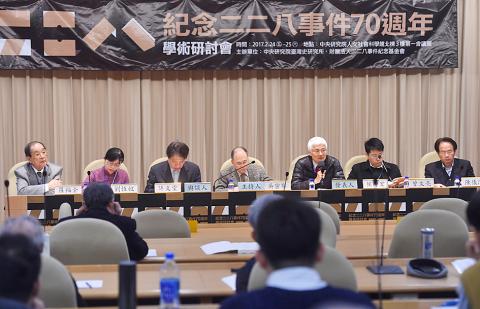Evidence shows that Chiang Kai-shek (蔣介石) should be held responsible for the 228 Incident, an academic said on Thursday.
A document dated March 2, 1947, requesting the dispatch of at least a regiment to help quell protests, which was read and approved by Chiang, and the fact that then-Taiwan governor Chen Yi (陳儀) and Peng Meng-chi (彭孟緝), a major-general at the Kaohsiung garrison, were promoted after the crackdown demonstrates that Chiang has ultimate responsibility for the incident, said Chen Yi-shen (陳儀深), an associate research fellow at Academia Sinica’s Institute of Modern History.
Chen Yi-shen made the statement at a conference in Taipei to launch six more volumes of the Collected Files of the 228 Incident published by Academia Historica.

Photo: Chien Jung-fong, Taipei Times
The 228 Incident was triggered by a clash between government officials and an illegal cigarette vendor in Taipei on Feb. 27, 1947. The event quickly turned into an anti-government uprising and was put down by the then-Nanjing-based Chinese Nationalist Party (KMT) government in China.
An estimated 18,000 to 28,000 people were killed during the crackdown, which lasted into early May, according to an investigation commissioned by the Cabinet in 1992.
The six volumes — Vol. 19-24 in the series — include files about the incident from the Presidential Office, the Changhua County Government and what was at the time the Taichung County government.
President Tsai Ing-wen (蔡英文) has promised to publish a report on transitional justice within three years and ordered the collection of government documents detailing political and other types of persecution, Academia Historica director Wu Mi-cha (吳密察) said.
The National Archives Administration has identified about 13,000 cases relating to the 228 Incident and political persecution, Wu said.
Tsai said that her administration has an obligation to determine the truth of the incident in an open and transparent manner so that responsibility can be more accurately apportioned.
Documents relating to the 228 Incident include a telegram issued on March 6, 1947, released in 1992, and two others dated Feb. 28 and March 4, 1947, released in 2008, National Taiwan University history professor Chen Tsui-lien (陳秀蓮) said.
However, the March 2, 1947, telegram by Chen Yi, which was referenced by later documents, makes it clear that Chiang was aware what the Taiwan governor was planning to do, Chen Tsui-lien said.
A report on the 228 Incident published in 2006 said that Chiang was primarily responsible for the crackdown, with Chen Yi and Peng directly responsible for the behavior of troops in Taiwan, Chen Yi-shen said, adding that the document released as part of the newly published files offered more evidence of the 2006 report’s accuracy.
A cult of personality is not proper in a democracy and on that basis alone the Chiang Kai-shek Memorial Hall should be redesignated as either a national human rights museum or a memorial museum for former presidents of the Republic of China, Chen Yi-shen said.

‘DENIAL DEFENSE’: The US would increase its military presence with uncrewed ships, and submarines, while boosting defense in the Indo-Pacific, a Pete Hegseth memo said The US is reorienting its military strategy to focus primarily on deterring a potential Chinese invasion of Taiwan, a memo signed by US Secretary of Defense Pete Hegseth showed. The memo also called on Taiwan to increase its defense spending. The document, known as the “Interim National Defense Strategic Guidance,” was distributed this month and detailed the national defense plans of US President Donald Trump’s administration, an article in the Washington Post said on Saturday. It outlines how the US can prepare for a potential war with China and defend itself from threats in the “near abroad,” including Greenland and the Panama

A magnitude 4.9 earthquake struck off Tainan at 11:47am today, the Central Weather Administration (CWA) said. The hypocenter was 32.3km northeast of Tainan City Hall at a depth of 7.3km, CWA data showed. The intensity of the quake, which gauges the actual effect of a seismic event, measured 4 in Tainan and Chiayi County on Taiwan's seven-tier intensity scale, the data showed. The quake had an intensity of 3 in Chiayi City and County, and Yunlin County, while it was measured as 2 in Kaohsiung, Nantou County, Changhua County, Taitung County and offshore Penghu County, the data showed. There were no immediate reports of

The Chinese Nationalist Party (KMT) is maintaining close ties with Beijing, the Democratic Progressive Party (DPP) said yesterday, hours after a new round of Chinese military drills in the Taiwan Strait began. Political parties in a democracy have a responsibility to be loyal to the nation and defend its sovereignty, DPP spokesman Justin Wu (吳崢) told a news conference in Taipei. His comments came hours after Beijing announced via Chinese state media that the Chinese People’s Liberation Army’s Eastern Theater Command was holding large-scale drills simulating a multi-pronged attack on Taiwan. Contrary to the KMT’s claims that it is staunchly anti-communist, KMT Deputy

RESPONSE: The government would investigate incidents of Taiwanese entertainers in China promoting CCP propaganda online in contravention of the law, the source said Taiwanese entertainers living in China who are found to have contravened cross-strait regulations or collaborated with the Chinese Communist Party (CCP) could be subject to fines, a source said on Sunday. Several Taiwanese entertainers have posted on the social media platform Sina Weibo saying that Taiwan “must be returned” to China, and sharing news articles from Chinese state media. In response, the Mainland Affairs Council (MAC) has asked the Ministry of Culture to investigate whether the entertainers had contravened any laws, and asked for them to be questioned upon their return to Taiwan, an official familiar with the matter said. To curb repeated